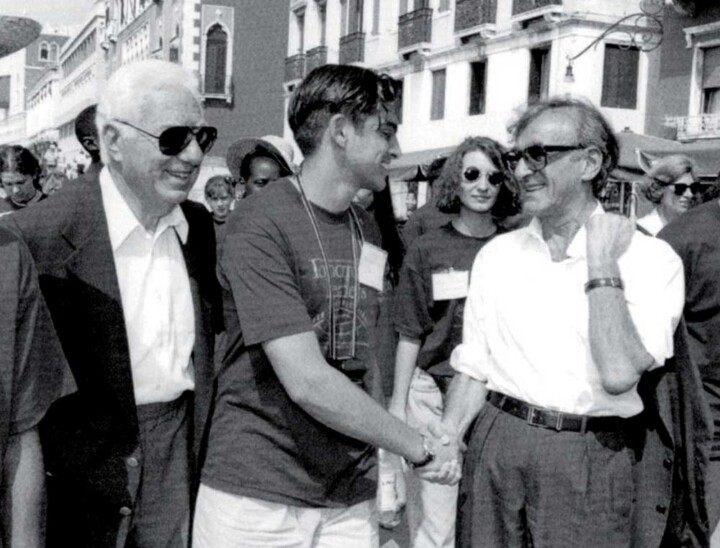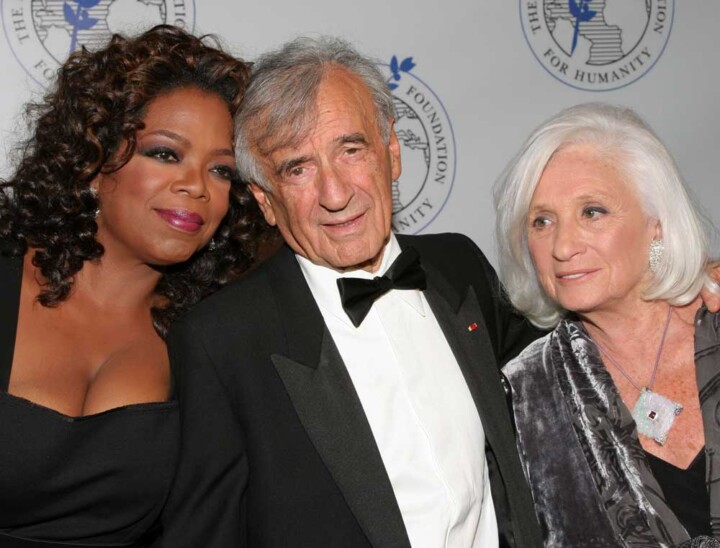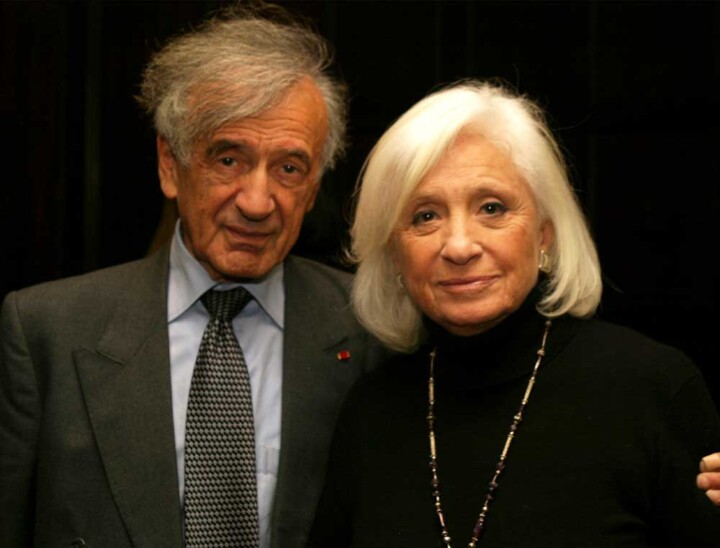Elie Wiesel was born in 1928 in Sighet, Transylvania, now a part of Romania.
He was 15 years old when he and his family were deported by the Nazis to Auschwitz. His mother and younger sister perished, his two older sisters survived. Elie and his father were later transported to Buchenwald, where his father died shortly before the camp was liberated in April 1945.
After the war, Elie Wiesel studied in Paris and later became a journalist.
During an interview with the distinguished French writer, Francois Mauriac, he was persuaded to write about his experiences in the death camps. The result was his internationally acclaimed memoir, La Nuit or Night, which has since been translated into more than thirty languages.
In 1978, President Jimmy Carter appointed Elie Wiesel as Chairman of the President’s Commission on the Holocaust.
In 1980 he became the Founding Chairman of the United States Holocaust Memorial Council. He is also the Founding President of the Paris based Universal Academy of Cultures. Elie Wiesel has received over one hundred honorary degrees from institutions of higher learning.
Understanding the power of being a witness and testimony,
Elie Wiesel defended and spoke out in support of many marginalized people: the Soviet Jews, Nicaragua’s Miskito Indians, Argentina’s Desaparecidos, Cambodian refugees, the Kurds, victims of famine in Africa, victims of apartheid in South Africa, and the victims of war in the former Yugoslavia.
Teaching had always been central to Elie Wiesel’s work.
Since 1976, he had been the Andrew W. Mellon Professor in the Humanities at Boston University, where he also held the title of University Professor.
Professor Elie Wiesel taught lectures and classes at many universities around the country. For over 20 years, he led a winter term class at Eckerd College in St. Petersburg, Florida, as well as doing a lecture series through the Rodgers Center for Holocaust Education at Chapman University in Orange, California.
Elie Wiesel is the author of more than sixty books of fiction and non-fiction.
He had received numerous awards for his literary and human rights activities including the Presidential Medal of Freedom, the U.S. Congressional Gold Medal and the Medal of Liberty Award, and the rank of Grand Officer in the French Legion of Honor. In 1986, Elie Wiesel won the Nobel Prize for Peace. A few months later, Marion and Elie Wiesel established The Elie Wiesel Foundation. Professor Elie Wiesel passed away in New York City July 2nd, 2016.
Champion of Israel.
Elie Wiesel was a Zionist. He believed that the rebirth of State of Israel was a modern miracle which was the Jewish people’s only guarantee against a second Holocaust. Whenever Israel was in danger, he flew there to stand with her. He firmly believed that only Israel’s citizens could determine how to balance a strong security posture with the pursuit of peace. He stood forcefully at every turn against the haters of Israel who attacked her for daring to defend her citizens – but also helped bring Ehud Olmert face to face with Mahmoud Abbas when a window for peace was glimpsed in 2006.
“When a Jew visits Jerusalem for the first time, it is not the first time, it is a homecoming."
Excerpt from “A World in Crisis: What Are Our Moral Obligations?” given at the 92nd Street Y on Apr 15, 2010
"Well, for a Jew of my generation, Israel represents a miracle that renews itself every day. At times it is difficult for us to relate to it and to dream what it embodies. We are seized by a strange yet not so strange feeling that personally and ontologically we owe it something. Without Israel would we have had the motivation and the strength to begin our life again and build on ruins? Often I wonder, how did the Jewish people manage to rise up from an oppressive state of mourning three years after the most murderous war in recorded history? It issued a challenge to destiny and proclaimed a new Jewish state on its ancestral soil."
Excerpt from “The Solitude of God, Mortals, and Israel Solitude for Man, for God, and for Israel” given at the 92nd Street Y on Nov 16, 2000
“Is it that, as often before, too many people forgot that war is an act of despair, whereas peace is an offering of hope?”
Excerpt from “Memory and Ethics: Readings and Commentaries The Beauty of Memory, The Difficulty of Being Ethical” given at the 92nd Street Y on Apr 26, 2007
“For so long concerned more with time than space, obsessed more with impossible than the possible, Israel today elicits both hope, the noblest of hopes, which is peace, but also apprehension. Will its future be longer than its past? Will there ever be harmony in that land, filled with memory and longing? Does hope have a future in that part of the world?”
Excerpt from “Readings and Memories Knowing the Tales and Reading Them Aloud” given at the 92nd Street Y on Oct 30, 1997
“I admire Israel for its achievement. But I admire Israel for being. The Jew in me loves Israel, when Israel suffers and when it is triumphant, when it is distressed, and when it is jubilant. I love Israel for its memory, and for its hope. Without that love, my love for anything else would be diminished. Thanks to it, all my endeavors in every field are enriched.”
Excerpt from “Israel: New Fears, Old Hopes The Relationship Between the Shoah and Israel: The Secret of Jewish History Beginning Again” given at the 92nd Street Y on May 1, 2008


